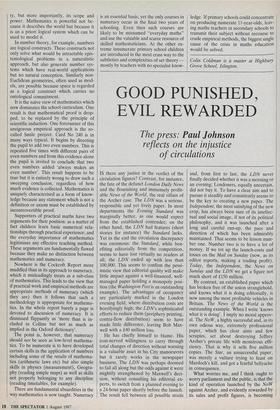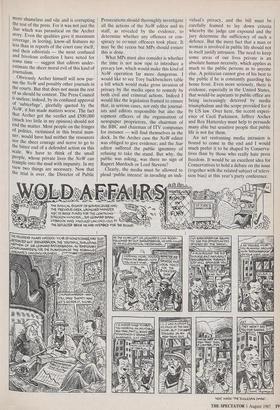GOOD PUNISHED, EVIL REWARDED
The press: Paul Johnson reflects on the injustice of circulations
IS there any justice in the verdict of the circulation figures? Contrast, for instance, the fate of the defunct London Daily News and the flourishing and immensely profit- able News of the World, the real villain of the Archer case. The LDN was a serious, responsible and yet lively paper. In most departments the Evening Standard was marginally better, as one would expect from the established contender; on the other hand, the LDN had features (short stories for instance) the Standard lacks. Yet in the end the circulation discrepancy was enormous: the Standard, while ben- efiting editorially from the competition, seems to have lost virtually no readers at all; the LDN ended up with less than 100,000. This seems to confirm the pessi- mistic view that editorial quality will make little impact, against a well-financed, well- managed paper holding a monopoly posi- tion (the Washington Post is an outstanding example). The advantages of occupancy are particularly marked in the London evening field, where distribution costs are horrifyingly high; the LDN's sophisticated efforts to reduce them (periphery printing, contra-flow distribution) seem to have made little difference, leaving Bob Max- well with a £40 million loss.
He has chiefly himself to blame. His iron-nerved willingness to carry through total changes of direction without warning is a valuable asset in his City manoeuvres but it rarely works in the newspaper business. The LDN was perhaps doomed to fail all along but the odds against it were mightily strengthened by Maxwell's deci- sion, without consulting his editorial ex- perts, to switch from a planned evening to a 24-hour paper shortly before the launch. The result fell between all possible stools and, from first to last, the LDN never finally decided whether it was a morning or an evening; Londoners, equally uncertain, did not buy it. To have a clear aim and to pursue it steadily and consistently seems to be the key to creating a new paper. The Independent, the most satisfying of the new crop, has always been sure of its intellec- tual and social image, if not of its political philosophy, and it was launched after a long and careful run-up, the pace and direction of which has been admirably maintained. That seems to be lesson num- ber one. Number two is to have a lot of money. If we tot up the launch-costs and losses on the Mail on Sunday (now, as its editor reports, making a trading profit), Today, the Independent, the News on Sunday and the LDN we get a figure not much short of £150 million.
By contrast, an established paper which has broken free of the union stranglehold, and knows what it is doing editorially, is now among the most profitable vehicles in Britain. The News of the World is the outstanding example. When I write 'knows what it is doing', I imply no moral approv- al. The NoW, a highly successful and, in its own odious way, extremely professional paper, which has clear aims and few scruples, set about destroying Jeffrey Archer's private life with monstrous effi- ciency. That is why it sells five million copies. The Star, an unsuccessful paper, was merely a vulture trying to feast on Murdoch's kill, and got a fearful bellyache in consequence.
What worries me, and I think ought to worry parliament and the public, is that the kind of operation launched by the NoW against Archer, and evidently rewarded by its sales and profit figures, is becoming more shameless and vile and is corrupting the rest of the press. For it was not just the Star which was parasitical on the Archer story. Even the qualities gave it maximum coverage, in leering, know-all features no less than in reports of the court case itself, and their editorials — the most confused and frivolous collection I have noted for some time — suggest that editors under- estimate the sheer moral evil of this kind of journalism.
Obviously Archer himself will now pur- sue the NoW and possibly other journals in the courts. But that does not mean the rest of us should be content. The Press Council is useless; indeed, by its confused approval of 'subterfuge', gleefully quoted by the NoW, it has made matters worse. The fact that Archer got the verdict and £500,000 (much too little in my opinion) should not end the matter. Most people on the fringes of politics, victimised in this brutal man- ner, would have had neither the resources nor the sheer courage and nerve to go to the bitter end of a defended action on this scale. We have to think of the small people, whose private lives the NoW can trample into the mud with impunity. In my view two things are necessary. Now that the trial is over, the Director of Public Prosecutions should thoroughly investigate all the actions of the NoW editor and its staff, as revealed by the evidence, to determine whether any offences or con- spiracy to co'nmit offences took place. It may be the recess but MPs should ensure this is done.
What MPs must also consider is whether the time is not now ripe to introduce a privacy law, which would make this kind of NoW operation far more dangerous. I would like to see Tory backbenchers table a bill which would make gross invasion of privacy by the media open to remedy by both civil and criminal actions. Indeed I would like the legislation framed to ensure that, in serious cases, not only the journal- ists and editors responsible but also the topmost officers of the organisation of newspaper proprietors, the chairman of the BBC and chairman of ITV companies for instance — will find themselves in the dock. In the Archer case the NoW editor was obliged to give evidence; and the Star editor suffered the public ignominy of refusing to take the stand. But why, the public was asking, was there no sign of Rupert Murdoch or Lord Stevens?
Clearly, the media must be allowed to plead 'public interest' in invading an indi-
vidual's privacy, and the bill must be carefully framed to lay down criteria whereby the judge can expound and the jury determine the sufficiency of such a defence. But the mere fact that a man or woman is involved in public life should not in itself justify intrusion. The need to keep some areas of our lives private is an absolute human necessity, which applies as much to the public persons as to anyone else. A politician cannot give of his best to the public if he is constantly guarding his home front. Even more seriously, there is evidence, especially in the United States, that would-be aspirants to public office are being increasingly deterred by media triumphalism and the scope provided for it by US law. Over here, the recent experi- ence of Cecil Parkinson, Jeffrey Archer and Roy Hattersley must help to persuade many able but sensitive people that public life is not for them.
An act restraining media intrusion is bound to come in the end and I would much prefer it to be shaped by Conserva- tives than by those who really hate press freedom. It would be an excellent idea for Conservatives to hold a debate on the issue (together with the related subject of televi- sion bias) at this year's party conference.



















































 Previous page
Previous page